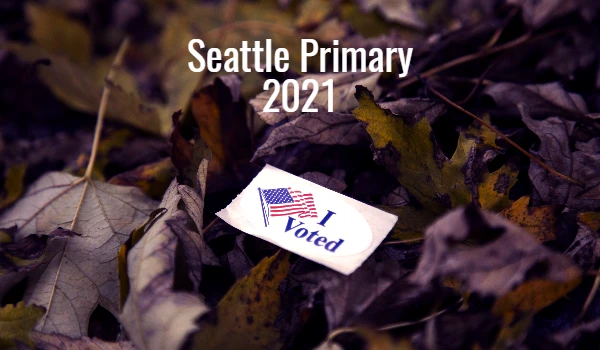Some early reactions to the local election held Tuesday:
Last In, Last Place. Those in the Seattle mayor’s race who waited to get in late did poorly. It confirms the hold of major interests on local politics. If you wait until the last year (or the last months), you’ll find all the endorsements and big money and major campaign consultants already spoken for. Lorena Gonzalez, who finished a very strong second, had locked up the labor unions, social service agencies. Bruce Harrell had locked up the business support. And it you get in, you better have a resonant new idea or two, and be able to land a punch on the front-runners.
What’s in a Name? If you are going to get in late, as Casey Sixkiller, Jessyn Farrell, Art Langlie, and Colleen Echohawk did, you better have a well-known name (and apparently dads or granddads don’t count). As it was, with very low turnout, the well-known Harrell and Gonzalez prevailed by wide margins. On the other hand, the slightly well-known incumbent city attorney Pete Holmes did poorly.
The Urban-suburban Split. Out in King County, the key issue is how much of the urban agenda (housing, homeless, social services) should these communities take on, particularly as less-affluent residents are driven out of a gentrifying Seattle. A good example is Mercer Island’s city council, where the incumbent candidate, Lisa Anderl, who favors public safety and less residential urbanization of the town, finished seven points behind Kate Akyuz, who favors more social services. A similar situation applies to Redmond, another city that is “growing up.”
In a sense, this may be the main issue in the Seattle mayor’s race, with Harrell protecting the single-family neighborhoods and taking a tougher line on homeless encampments, and Gonzalez siding with the density advocates and attacking the racist subtexts of single-family zoning. The developers, a key interest group, are allies of the urbanizers.
Retail Politicians. Ideology aside, a lot depends on how good candidates are at retail politics — pressing the flesh, hearing the citizens, relating to ordinary, kitchen-table concerns, showing up. Bruce Harrell is very good at retail politics, while Gonzalez is untested and often skips events. For the city council seat, Nikkita Oliver is a talented stump politician, much more so than Sara Nelson.
A Doldrums Election. Early August translates into issue-lite campaigns and low turnout. The frequent voters, who are older and tend to favor the status quo, dominate — misleadingly for the November election. You can see in the county that “more of the same” prevailed, and the incumbents easily earned new terms (except for Kathy Lambert’s modest 7-point advantage over the far more progressive Sarah Perry). The youth revolt and the Movement Left failed to show up (for now).
The Insurgent Status Quo. Seattle’s dominant leftist politics is up for referendum in the coming general election. Keep in mind how much is at stake for these rising politicians like Joe Nguyen (challenger to Dow Constantine for county exec), anti-racism forces, the homeless-industrial-complex, Bernie Bro’s, and labor. They hold the commanding heights of Seattle politics and so have the most to lose. They have the advantages of organizational momentum, media sympathy, energy, and national donations (and strategic advice).
This dynamic is the subtext of both the Recall Sawant election (which will help mobilize young Left voters) and the Charter Amendment on homelessness (a direct challenge to the low-progress, soft-on-crime status quo). Those who challenge the entrenched power of this “insurgent status quo” badly lack exciting issues other than nostalgic evocations of Sepia Seattle. In short, the primary is far from predictive of the November battles.
Discover more from Post Alley
Subscribe to get the latest posts sent to your email.

IF your campaigning doesn’t attack something or talk about change, you are an also ran.
The first two points contain inaccuracies. “Last In, Last Place” clearly doesn’t apply to the City Attorney’s race where the current top two candidates didn’t get in until the literal last possible moment: an hour before the May filing deadline. In the next section, Colleen Echohawk (who announced her run in January) is lumped in with candidates who announced in March (Farrell) and May (Sixkiller and Langlie). Echohawk announced her run before either of the two mayoral candidates who made it through to the general (Harrell and González), yet she is listed as someone who didn’t announce early enough. That characterization is factually inaccurate.
Fair point, misogynynotrequired, about the city attorney’s race, but Holmes was tempting fate by seeking a fourth term while lacking a solid base of support, so I’m not surprised he got squeezed out. As for Echohawk, my point was that she needed to start much earlier, being relatively unknown and up against two candidates (Harrell and Gonzalez) who were going to scoop up cash and endorsements.
One of the misleading analogies in the mayor’s race was Mayor Norm Rice’s very-last-minute entrance into the 1989 mayor’s race, but Rice was a very well known political figure who hesitated because he had just lost two races and feared he was a goner, politically. Accordingly, both Sixkiller and Langlie vied to be the last-in candidates, thinking there would be a publicity boon that way and that they would have taken fewer political shots by waiting. No such luck.